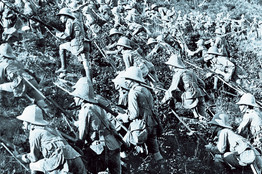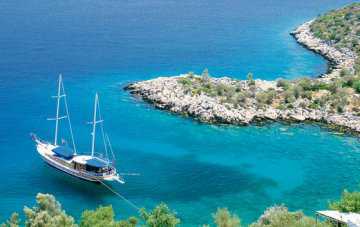How a British gambit in World War I turned into a battlefield fiasco
By ROBERT MESSENGER
On Feb. 19, 1915, British warships attempted to force the heavy Turkish defenses of the Dardanelles, the entrance to the straits in northern Turkey that are the key link between the Mediterranean and the Black Sea. The British struck in search of an indirect approach to victory. World War I was in stalemate, the two sides locked into trench warfare in northern France. The hope was that a battle fleet appearing off Istanbul would compel Turkey’s capitulation, secure a supply route to hard-pressed Russia, and inspire the Balkan states to join the Allied war effort and eventually to attack Austro-Hungary, thereby pressuring Germany.
The British government gave much consideration to the eventual division of the Ottoman lands once the straits were captured but very little to how the operation might actually be executed. The amateurish preparation and the resulting fiasco are recounted with sharp, taut precision in “Gallipoli: The End of the Myth,” Robin Prior’s near-definitive analysis of the campaign.
British troops advance at Gallipoli, Aug. 6, 1915.
The assumption that Britain would simply sweep to victory over second-rate Turkey was just the first of many errors of judgment. At each stumble, when a logical examination of the campaign would have had only one possible conclusion-withdrawal-Britain’s leaders doubled down, eventually committing a half-million troops to the Gallipoli Peninsula in a sequence of bloody landings and operations.
The initial landing at Cape Helles set the tone for the eight months of fighting: a landing that was supposed to be only lightly opposed turned into an abattoir. A captain in one of the first regiments to land wrote in his diary: “Off we went the men cheering and dashed ashore with Z Company. We got it like anything, man after man behind me was shot down but they never wavered. Lieut. Watts who was wounded in five places and lying on the gangway cheered the men with cries of ‘follow the captain.’ Captain French of the Dublins told me afterwards that he counted the first 48 men to follow me, and they all fell.”
By the time all the Allied troops were finally evacuated on Jan. 9, 1916, they had suffered 130,000 battlefield casualties, with probably twice that number invalided because of diseases such as dysentery and typhoid. For an attack conceived as a way of reducing the carnage in northern France, it doubly failed.
The historians took to the fields of Gallipoli almost the moment the soldiers left them. The poet and essayist John Masefield had piloted a naval ambulance during the campaign, and his “Gallipoli”-which originated as a series of lectures for the American market-became a best seller in 1916. Masefield romanticized the slaughter, drawing parallels between the khaki-clad troops and the epic heroes who fought on the Asiatic coast of the Dardanelles, before a city called Troy.
Later in 1916 came C.E.W. Bean’s “Anzac Book,” an anthology of poems, stories and drawings by the soldiers of the Australia and New Zealand Army Corps (ANZAC)-“Practically every word in it was written and every line drawn beneath the shelter of a waterproof sheet or of a roof of sandbags.” Bean, who had won a lottery to be the official Australian newspaperman with ANZAC, would become a chief mythmaker of the campaign. Appointed official historian of Australia’s experience in World War I, he wrote six of the 14 volumes whose publication he would oversee, including the first two volumes, on Gallipoli.

Bean propounded the idea that the colonial troops were stoic and tough and led to the slaughter by bumbling, effete Brits. He ended his history with the declaration that “it was on the 25th of April, 1915, that the consciousness of Australian nationhood was born.” April 25, the date of the first landings at Gallipoli, became Australia’s national day of remembrance, and the legend of Ginger Mick, shipped across the world to be slaughtered on Turkish beaches because of old men’s folly, is still widely known.
The biggest bumbler in popular perception was Winston Churchill. As First Lord of the Admiralty, he was the father of the Dardanelles attack and bore the brunt of the blame. The bloody disaster shattered his glittering political career. For close to a decade his speeches were interrupted by cries of “What about Gallipoli?”
In 1922, Churchill began a memoir to defend his wartime decisions. (That the book evolved into a six-volume general history of World War I called “The World Crisis” is all too indicative of the man.) The defense of the Gallipoli campaign is at the heart of the narrative. It is a sequence of almosts and if onlys.
Churchill presents the strategic conception in the rosiest of hues, and the execution, especially the performance of Britain’s minister for war, Herbert Kitchener, in the grayest. “The World Crisis” depicts Gallipoli as a noble failure, an effort that would have saved innumerable lives on the Western Front had it been undertaken with tactical competence.
For Churchill, it was “a long chain of missed chances,” missed because the government delayed the attacks repeatedly-allowing defensive buildups by the Turks at all the critical points-and failed to respond to setbacks promptly, with sufficient troops and ammunition. “It was not through want of judgment that they failed, but through want of will-power,” Churchill wrote. “In such times the kingdom of heaven can only be taken by storm.” (He also called the government’s failure to persevere a “crime.”) Churchill’s interpretation was seconded a few years later by the British official history of the campaign. Its author, Cecil Aspinall Oglander, had been a senior staff officer during the fighting and had a strong desire to defend conduct he held much responsibility for.
“The Royal Navy had ruled supreme since Trafalgar. In the early years of the twentieth century its position had been tested by the rapid growth of the German fleet. But at the outbreak of war the Royal Navy was still dominant. ” Read an excerpt from ‘Gallipoli: The End of the Myth’
Interest revived a generation later with Alan Moorehead’s 1956 best seller, “Gallipoli.” A popular war correspondent, Moorehead made a gripping narrative of the fighting. He emphasized “turning points” squandered by the local commanders and defended the Churchillian line that Gallipoli could have shortened the war by years. Moorehead relied on already published accounts. His book was “superb literature,” as Robert Rhodes James put it, “but doubtful history.” Disagreement with Moorehead’s conclusions-especially his acceptance of the claim that the campaign could have affected the outcome of the war against Germany-sent Rhodes James into the archives, and his “Gallipoli” (1965) was the first scholarly evaluation of the campaign.
He demonstrated that Gallipoli’s “errors in execution stemmed directly from the fundamental fallacies in the original conception.” It was a devastating appraisal of the self-justifying writings that had dominated the literature for nearly half a century. While Rhodes James noted Churchill’s mistakes, he also stressed Churchill’s essential good faith in pursuing the Gallipoli operation and showed that blame should have been apportioned throughout the highest quarters of the British government. In his new history, Robin Prior takes this line to its reasoned end.
For any operation to have succeeded at capturing the Dardanelles and allowing free access to the Black Sea, Mr. Prior argues, would have required immense operational preparations and the element of surprise. The one was always likely to negate the other-as was repeatedly proved on numerous fronts between 1914 and 1918. Mr. Prior shows that, from the moment of its consideration by the British war cabinet, the Gallipoli operation was managed in a lackadaisical manner by leaders uninterested in the realities of modern war. Where Churchill and Aspinall in their histories passed the buck down the chain of command, blaming local commanders for failing to achieve tactical successes during the battles on the Gallipoli peninsula, Mr. Prior kicks it up, right to the top of Prime Minister H.H. Asquith’s government.
Details
Gallipoli
By Robin Prior
Yale, 288 pages, $45
Step-by-step, Mr. Prior examines the campaign and demolishes each layer of myth. The Straits would not, in fact, have fallen to the British navy if only the admirals had acted with more resolve, he shows, because the admirals had no ability to deal with the Turkish minefields, even if they had miraculously managed to put the Turkish guns out of action. The landings could not have secured a passage into the Black Sea, we learn, because the terrain of the peninsula was a sequence of endlessly defensible ridges that would have required the whole of the British army to seize. Far from Turkey’s collapsing if the Allies had seized the Dardanelles, Turkey could simply have fought on, Mr. Prior says. Istanbul had adequate defenses against naval attack, and it is impossible to imagine the British bombarding a city full of civilians in hopes of encouraging a change of government. And Mr. Prior convincingly argues that the battles of Sari Bair and Suvla Bay did not, as so many historians have claimed, nearly salvage the British effort. In neither case were the objectives of decisive value; even if they had been, the British lacked the reserves with which to exploit success.
What becomes clear, too, is the absurdity of the belief that warring at Gallipoli could affect the ability of the Germans to war in northern France. “Despite the bravery of the troops who fought there, the campaign was fought in vain,” Mr. Prior concludes. “It did not shorten the war by a single day, nor in reality did it ever offer that prospect. . . . The downfall of Turkey was of no relevance to the deadly contest being played out of the Western Front.”
The battle for the soul of Gallipoli has raged on too long. “Gallipoli: The End of the Myth” is a decisive end to debate. It may not be the very last word, as Mr. Prior himself is involved in a long-term project to discover what the Ottoman archives hold. But it is military history of the highest order.
-Mr. Messenger is a senior editor at the Weekly Standard.








